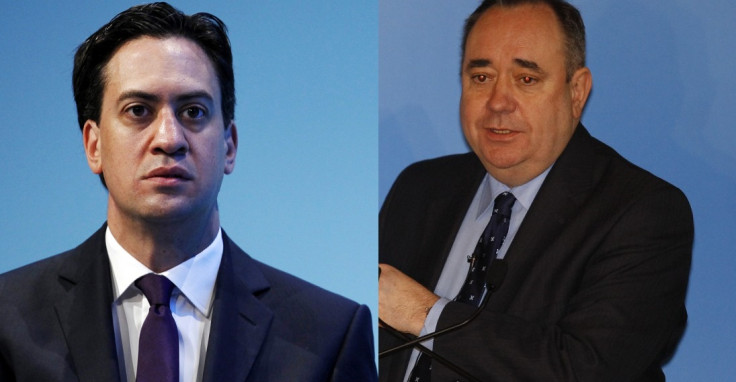SNP surge: Will the UK's most left-wing government since Attlee be elected in 2015?

The opinion polls are sending an unambiguous message. Unless there is a substantial change of fortunes very soon, an earthquake will hit both Scottish and British politics next May, with the SNP making huge gains from both Labour and the Liberal Democrats at the UK general election.
Most current projections suggest that the Lib Dems will be comfortably overtaken by Nicola Sturgeon's party as the third largest force in the House of Commons. Given the closeness of the race between the Conservatives and Labour, this opens up the fascinating prospect of Britain's fate being decided by politicians in Edinburgh, not London.
Both Alex Salmond and Nicola Sturgeon have already made abundantly clear that they will do everything in their power to prevent another Tory-led government taking office. In concrete terms, that means David Cameron's premiership will unquestionably come to an end if Labour, the SNP, Plaid Cymru, the SDLP and the Greens hold a parliamentary majority between them. The only game in town would be a Labour-led government, albeit one that would be under heavy SNP influence if, as seems likely, Ed Miliband falls well short of holding a majority of seats on his own.
Recognition of that reality has sent a shiver down many a right-wing spine of late. For a few short weeks after the independence referendum, Tory MPs allowed themselves to believe that they had achieved the impossible – keeping the union with Scotland (at least for now) while still getting rid of Labour's Scottish contingent in the Commons. But in truth, it was always David Cameron who was most threatened by the SNP surge. Every Liberal Democrat seat lost to the SNP means one more MP who will definitely vote the Tories out on any motion of confidence.
But it gets even worse than that for true believers in the centre-right consensus that has prevailed at Westminster since 1979. Unlike the Lib Dems, who have shown no interest in using their place in the current coalition to do anything more than moderate a few of the worst excesses of Toryism, the SNP would seek to use the balance of power in London to change the political weather entirely.
If the SNP gets its way on every front, austerity will end, the creeping privatisation of the National Health Service south of the border will be reversed, the minimum wage will be sharply increased, nuclear weapons will be relinquished, and Britain will join countries like Ireland in recognising that military adventures abroad can only take place with the explicit authorisation of the United Nations.

In short, we'd be looking at the most radical left-of-centre London government since Clement Attlee was ejected from office in 1951.
Before those of us who rather like the sound of all that get too excited, though, I'd better point out there's a big snag. By definition, partnership governments implement policies that are a blend of both partners' positions. As the senior partner in any deal, Labour's preferences would carry the greatest weight, meaning there are severe limits on how progressive the new administration can realistically be expected to be.
However much the left-leaning commentariat might like to believe that the old "Red Ed" jibe against the Labour leader contained a grain of truth, the reality is that Miliband has continued to chart a broadly centre-right course, with a fair few flashes of authoritarianism and ugly populism. Most notably, he has pandered to Ukip over immigration, promised to crack down more heavily on benefit claimants than even the current government has managed, and pledged to maintain many of Michael Gove's education "reforms".
With 25, 35 or perhaps even 45 seats, the SNP could be in a strong position in post-election negotiations with Labour, but there are a finite number of major concessions they will be able to wring out. Realistically, therefore, they will focus most of their efforts on the things which matter most to the people who voted for them. That will mean achieving maximum devolution for Scotland, or as close to it as humanly possible, while perhaps accepting that Labour will for the most part get its way on decisions that don't affect Scotland so much. Because of the SNP's strong ties with Plaid Cymru, it's likely that a significant transfer of powers to the Welsh Assembly will also form part of the deal. So a Labour-SNP government would indeed be the most radical administration since Attlee – but only for viewers in Scotland and Wales.
During the referendum, those of us on the Yes side warned the English Left that they couldn't save themselves by holding Scotland hostage. In the wake of the narrow No vote, Scots certainly can't bring about progressive governance in London by dutifully sending more Labour lobby-fodder to Westminster. And while a large SNP contingent will do their level best to be a force for good throughout the UK, their first duty will be to use their voting power to secure constitutional progress for Scotland. Exactly as would have been the case after independence, the English Left will ultimately have to save themselves in the difficult, old-fashioned way, by actually rebuilding support for their beliefs within their own country.
There is, however, one important exception to that general rule - Trident. Britain's nuclear weapons system is based in Scotland, just a stone's throw from the city of Glasgow, so the SNP certainly aren't going to shy away from seeking to make a mark on that particular UK-wide issue. The irony is, of course, that it was Clement Attlee and Ernest Bevin who made the UK a nuclear weapons state in the first place. So the greatest gift from an SNP-influenced government to progressive forces throughout these islands might well be to undo the most unfortunate act of the most progressive of past administrations.
Mini-bio : James Kelly is author of the Scottish pro-independence blog, SCOT goes POP! Voted one of the UK's top political bloggers, you can hear more from James on Twitter:@JamesKelly
© Copyright IBTimes 2025. All rights reserved.





















